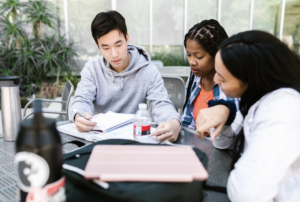How to get a top score in your IB TOK Exhibition

For many students, getting a top mark can feel out of reach.
Perhaps you are struggling with which prompt to use for your Exhibition. Or maybe you are not sure if you have linked to the theme in the best way to score a 10. Does this relate?
We see students who find the abstract nature of the course frustrating, and the complicated requirements overwhelming.
In this article, we explore here how you can improve all aspects of your Exhibition, and where you can get more help if you need it.
Our team of IB teachers and Examiners who contributed to this article have decades of TOK experience. And they are there to help if you find you need a tutor, click here.
We work with you to get the best possible score in your TOK Exhibition.
What is the TOK Exhibition?
It’s a new part of the TOK assessment, first examined in 2022 (so make sure you are not using old resources). There is no group work possible now, as it is a piece of individual work.
It was inspired by a project created by the British Museum, “History of the world in 100 objects.” Here is a podcast with the same name. The BBC also broadcasted a series of the same name.
IBO says “The TOK exhibition assesses the ability of the student to show how TOK manifests in the world around us.”
The Exhibition itself is a 950-word reflection that accompanies photos of the 3 exhibits/objects that you have chosen. Usually, the Exhibition is a school event and can be live or virtual.
It is internally assessed and externally moderated. This means a teacher in your school will mark it and then the IB requests a selection for moderation.
How important is it to the final TOK score?
The Exhibition is worth 1/3 of the total marks, with the Essay accounting for the other 2/3 of the final score. It is marked out of 10, just as the TOK Essay is.

How to choose the three objects?
At first, it might sound a bit limiting, or dull. But actually, the fact you have to choose a very specific object can make it interesting. The challenge is to pick an area that really interests and inspires you.
By doing this your enthusiasm will come across in your work and your Exhibition will be more likely to score highly. Corinna, one of our TOK IB teachers agrees.
She says “it is important to choose something with deeper personal significance as this will give them more to write about and create more opportunities to connect to the writing prompt and to link to their core theme”.
So, instead of choosing a postage stamp (too general), you could choose the Suez Canal commemorative stamp. It was issued in July 1956, and allows you to explore the Suez crisis and all the associated themes.

The objects can also be digital. So, this could be a social media post, as long as it is a specific one, or it could be a digital article.
Usually, the object will be represented by a photo. In this way, you can pick Appollo 13 if you like, and you don’t have to worry about how to get a rocket into your school building!
In fact, the criterion given by the IBO is that they must be “specific objects that have a specific real-world context. So, objects that exist in a particular time and place (including virtual spaces)”.
What is the hardest part of the TOK Exhibition?
Our TOK teachers unanimously say most of the students they work with find the selection of their personal objects the most difficult part. In fact, some students have trouble linking inanimate objects to profound concepts and ideas.
However, this is the whole point of the task! The TOK Exhibition encourages students to look deeper at their surroundings and to look deeper within themselves.
How to choose which IA prompt to use?
First and foremost do not change any aspect of the prompt you choose. As by doing this you risk getting zero marks.
Instead, look at the 35 prompts provided by the IB and pick the one you want to work with. Then, link all three objects to this ONE prompt. If you want to review all 35 prompts to help make your choice, they are at the bottom of this article.
What can I do to turn my good TOK Exhibition into a top-scoring one?
1. You need to make sure you are covering the basics:
So present your TOK Exhibition folder correctly, following the guidelines from the IB (below).
Students should produce a single file containing their TOK exhibition. This must include:
- a title clearly indicating their selected IA prompt
- images of their three objects
- a typed commentary on each object that identifies each object and its specific real-world context, justifies each object’s inclusion in the exhibition, and links to the IA prompt (maximum 950 words)
- appropriate citations and references.
2. Make sure your three objects are based on ONE of the core or optional themes.
3. Use good TOK Exhibition examples to improve your own work.
Your teacher will have provided you with some examples of good TOK Exhibitions. (If not, then ask for one.) Now is the time to look at these critically and ask yourself what they have that yours does not. And how are you going to improve yours?
4. Compare your Exhibition with the rubric.
One of our IB teachers Corinna also says students can dramatically improve their “scores by carefully comparing their writing to the TOK Exhibition rubric. Then editing, rewriting and sometimes even refocusing their writing to reflect that they understand what the rubric is asking of them.”
5. Make the most of your ONE round of teacher feedback.
Teachers can give feedback just one round of feedback on a draft. So this means either oral or written feedback on how the exhibition can be further improved. Plus, they are NOT allowed to edit your draft.
Book free trial with our certified IB teachers today
100 % of tutors are certified teachers and examiners
This means the old saying is true, poor draft equals poor feedback!
So, what you need to do is make your draft as good as possible before you hand it in for feedback. Don’t waste your one shot!

What are traps to avoid with the TOK Exhibition?
Students often get off track with their Exhibition essays when they try to find commonalities between their objects. Although it might seem illogical, there is no need to make connections or comparisons between the objects themselves.
This may be stating the obvious, but it is essential you ensure you are respecting all aspects of academic honesty in your work. As your work will be checked by anti-plagiarism software.
Here you will find the IBO subject specification for further reading about the whole TOK course, including the Exhibition and what it entails, in case you have further questions.
TutorsPlus provides expert TOK tutors to help international students prepare, get ahead or catch up. If you need help from one of our experienced IB TOK teachers, we are just a click away.
Our tutors know the IB inside-out and truly work magic to draw out each student’s ability to self-direct their learning. You can reach TutorsPlus at 022 731 8148 or
By Sara Lloyd
Sara has been an education consultant for TutorsPlus for 15 years and is an expert on international IB education. She is also a parent of two lively children.















